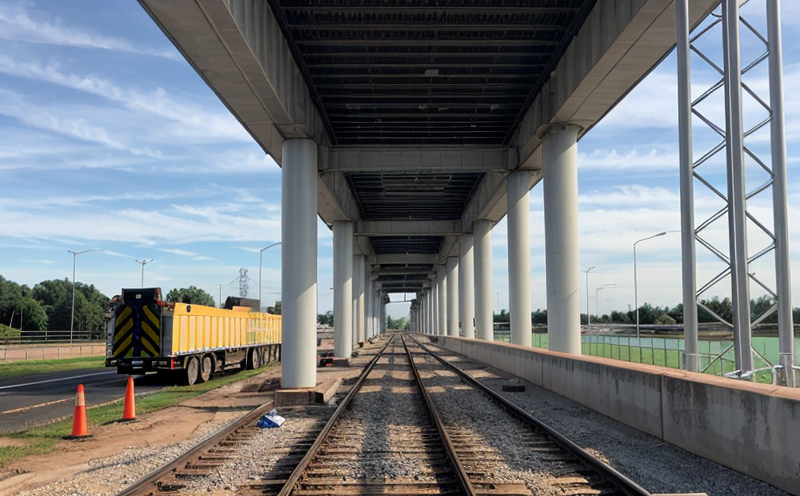ISO 6788 Bridge Deflection Measurement
The ISO 6788 bridge deflection measurement is a critical testing procedure designed to evaluate the structural integrity and performance of bridges under various loading conditions. This test ensures that bridges comply with international standards for safety, durability, and reliability.
The process involves measuring how much a bridge deck deflects when loaded, providing insights into its ability to support traffic loads without excessive deformation. The accuracy of these measurements is crucial for maintaining the structural integrity and longevity of infrastructure assets.
ISO 6788 specifies the method of testing for deflections in bridges using portable load vehicles or other loading devices. This standard ensures that all test results are comparable, providing a consistent approach to bridge evaluation worldwide.
The protocol includes detailed instructions on how to position sensors and load points, ensuring accurate data collection during the measurement process. Compliance with this international standard is essential for quality assurance in bridge construction and maintenance projects.
Understanding the key parameters involved in ISO 6788 testing helps stakeholders make informed decisions about infrastructure investments. These include loading types (static or dynamic), sensor placement, temperature considerations, and post-test analysis techniques.
The application of this standard is particularly important for ensuring that bridges meet international safety regulations. By adhering to these guidelines, engineers can ensure their designs are robust enough to handle anticipated traffic loads while minimizing unnecessary material usage.
Moreover, regular compliance with ISO 6788 helps prevent costly repairs and potential accidents by identifying issues early in the lifecycle of a bridge. This proactive approach supports long-term sustainability goals for transportation networks globally.
In summary, ISO 6788 bridge deflection measurement is an indispensable tool for assessing structural health and ensuring compliance with global standards. Its importance cannot be overstated when it comes to maintaining safe, efficient, and reliable infrastructure systems.
Industry Applications
The ISO 6788 bridge deflection measurement is widely used in various sectors where structural integrity plays a critical role. Construction companies, government agencies responsible for public works projects, and independent testing laboratories frequently employ this method.
In the construction industry, this test helps verify that newly built bridges meet design specifications before they are put into service. This ensures public safety by confirming that new structures can withstand expected loads without compromising their integrity.
Government agencies overseeing transportation infrastructure also rely on ISO 6788 compliance to ensure ongoing safety and efficiency of existing bridges. Regular inspections using this standard help identify areas needing repair or replacement, preventing accidents caused by structural failures.
Independent testing laboratories utilize the same procedures when performing third-party evaluations for insurance companies, consulting firms, or contractors seeking certification related to their projects involving bridge construction.
The data gathered through ISO 6788 can also support research efforts aimed at developing new materials and design techniques that enhance durability and reduce maintenance costs over time. Such advancements contribute significantly towards more sustainable transportation networks worldwide.
Overall, the versatility of this testing procedure makes it an essential tool across multiple industries focused on improving infrastructure quality and safety standards globally.
Why Choose This Test
Selecting ISO 6788 bridge deflection measurement offers several compelling reasons for those involved in assessing structural integrity. Firstly, it provides a standardized approach that ensures consistent results across different locations and testing facilities.
This uniformity is crucial when comparing data from various sources or jurisdictions, allowing for more reliable conclusions about the overall condition of bridges worldwide. Secondly, compliance with this international standard enhances credibility and trust among stakeholders such as clients, regulators, and insurance providers.
By adhering to ISO 6788 guidelines, testing organizations demonstrate their commitment to quality assurance practices recognized globally. This can lead to increased business opportunities both domestically and internationally.
The precision offered by this method allows for early detection of potential problems, enabling timely interventions that avoid costly repairs or replacements later down the line. Early intervention also minimizes disruption caused by unexpected failures during peak usage periods.
Finally, regular compliance with ISO 6788 helps maintain long-term sustainability goals by supporting environmentally friendly practices through optimized material use and reduced waste generation associated with premature failure.
In conclusion, choosing ISO 6788 bridge deflection measurement not only enhances structural integrity but also contributes positively to environmental stewardship initiatives aimed at creating more sustainable transportation networks globally.
Quality and Reliability Assurance
The quality and reliability of ISO 6788 bridge deflection measurement are ensured through rigorous adherence to international standards. Compliance with these guidelines guarantees that all testing procedures follow best practices recognized worldwide.
This standardization ensures consistent results regardless of the location or facility performing the tests, enhancing confidence in the accuracy and validity of findings presented by different organizations involved in infrastructure assessment projects.
Adhering to ISO 6788 also promotes transparency within the testing process. By clearly outlining all steps required for accurate measurement, it becomes easier for stakeholders to verify that proper protocols have been followed throughout each stage of inspection and evaluation.
The precision offered by this method allows for early detection of potential issues before they escalate into more serious problems requiring extensive intervention. Early identification enables timely repairs or replacements where necessary without causing significant disruptions during peak usage periods.
Moreover, regular compliance with ISO 6788 helps maintain long-term sustainability goals by supporting environmentally friendly practices through optimized material use and reduced waste generation associated with premature failure.
In summary, the quality and reliability of ISO 6788 bridge deflection measurement are paramount in ensuring safe, efficient, and durable infrastructure systems. By following established international standards, testing organizations can provide accurate data that supports informed decision-making processes across multiple sectors.





